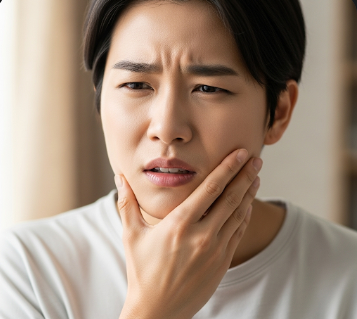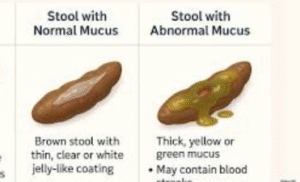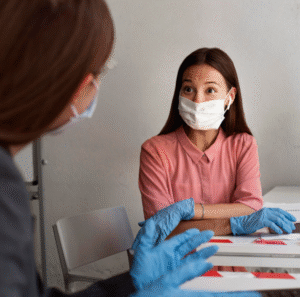Overview
Jaw pain, medically known as temporomandibular joint (TMJ) pain or orofacial pain, is a common condition that can affect chewing, speaking, and overall oral function. It may range from mild discomfort to severe, debilitating pain that impacts daily activities and quality of life.
In Korea, dental and maxillofacial clinics offer advanced evaluation and treatment for jaw pain, addressing underlying causes such as TMJ disorders, dental issues, trauma, or systemic conditions. Early diagnosis and treatment can relieve pain, restore function, and prevent long-term complications.
Key Facts
- ➔ Jaw pain can affect people of all ages, though TMJ disorders are most common in adults aged 20–40.
- ➔ Causes include TMJ disorders, arthritis, dental problems, trauma, nerve disorders, and muscle strain.
- ➔ Symptoms may include pain, clicking, popping, limited jaw movement, or headaches.
- ➔ Chronic jaw pain can lead to difficulty eating, speaking, or maintaining oral hygiene.
- ➔ Early evaluation ensures appropriate treatment and prevents chronic or severe complications.
What is Jaw Pain?
Jaw pain is discomfort or aching in the temporomandibular joint, surrounding muscles, or dental structures. The temporomandibular joint connects the jawbone (mandible) to the skull and allows movements such as opening, closing, chewing, and speaking.
- ➔ Temporomandibular joint disorders (TMD): Pain and dysfunction in the TMJ and surrounding muscles.
- ➔ Dental causes: Tooth infections, abscesses, or misaligned teeth can radiate pain to the jaw.
- ➔ Muscle strain: Overuse of jaw muscles from chewing, clenching, or grinding.
- ➔ Systemic causes: Arthritis or nerve disorders affecting jaw function.
Understanding the type and source of jaw pain is crucial for selecting effective treatment.
What Symptoms Are Related To
Jaw pain may present alongside a variety of symptoms:
- ➔ Pain or tenderness in the jaw, face, or around the ear
- ➔ Clicking, popping, or grating sounds when opening or closing the mouth
- ➔ Limited jaw movement or locking of the jaw
- ➔ Headaches or migraines, often in the temples
- ➔ Earaches, tinnitus (ringing in the ears), or dizziness
- ➔ Pain worsened by chewing, speaking, or yawning
Recognizing these related symptoms helps distinguish jaw pain from dental, neurological, or systemic conditions.
What Causes / Possible Causes
Jaw pain can result from muscle, joint, dental, or systemic issues:
- ➔ Temporomandibular joint disorders (TMD): Misalignment, arthritis, or inflammation of the TMJ.
- ➔ Teeth grinding or clenching (bruxism): Often occurs during sleep, causing muscle fatigue and joint stress.
- ➔ Dental problems: Tooth decay, abscesses, impacted wisdom teeth, or orthodontic issues.
- ➔ Trauma or injury: Accidents, falls, or sports injuries affecting the jaw.
- ➔ Arthritis: Osteoarthritis or rheumatoid arthritis affecting the TMJ.
- ➔ Nerve-related conditions: Trigeminal neuralgia causing sharp, shooting facial pain.
- ➔ Stress and posture: Muscle tension from stress, poor posture, or prolonged jaw activity.
Accurate diagnosis is essential to differentiate between benign muscle pain and conditions requiring surgical or specialized intervention.
When Should I See My Doctor
You should consult a healthcare provider if jaw pain:
- ➔ Persists for more than a few weeks without improvement
- ➔ Causes severe pain, jaw locking, or inability to open/close the mouth
- ➔ Is accompanied by swelling, redness, or fever
- ➔ Radiates to the ear, face, or neck with neurological symptoms
- ➔ Interferes with eating, speaking, or daily activities
- ➔ Occurs after trauma or injury
Prompt evaluation ensures early treatment, preventing chronic TMJ dysfunction or complications.
Care and Treatment
Management of jaw pain depends on the underlying cause, severity, and patient needs:
- ➔ Lifestyle and behavioral modifications: Avoid chewing hard foods, limit gum chewing, and manage stress.
- ➔ Pain relief: Over-the-counter painkillers, anti-inflammatory drugs, or muscle relaxants.
- ➔ Physical therapy: Jaw exercises, massage, and heat or cold therapy to reduce muscle tension.
- ➔ Dental interventions: Correcting bite issues, treating dental infections, or using occlusal splints (night guards).
- ➔ Minimally invasive procedures: Injections of corticosteroids or Botox in severe cases.
- ➔ Surgery: Rarely required; reserved for severe TMJ structural problems or trauma.
- ➔ Stress management: Meditation, relaxation exercises, and counseling to reduce muscle tension.
Combination therapies often produce the best outcomes, especially when muscle tension and TMJ dysfunction coexist.
Treatment Options in Korea
Korean dental, maxillofacial, and pain clinics provide advanced care for jaw pain:
- ➔ Comprehensive evaluation: Physical examination, jaw imaging (X-ray, MRI, CT), and dental assessment.
- ➔ Dental and orthodontic treatment: Correcting misalignment, occlusal issues, or treating infections.
- ➔ Physical therapy programs: Guided jaw exercises, posture correction, and muscle relaxation techniques.
- ➔ Medication management: Painkillers, anti-inflammatory drugs, and muscle relaxants tailored to patient needs.
- ➔ Minimally invasive interventions: Corticosteroid injections or Botox therapy for refractory cases.
- ➔ Multidisciplinary approach: Combining dentistry, maxillofacial surgery, physiotherapy, and stress management.
Top hospitals such as Seoul National University Hospital, Asan Medical Center, and Samsung Medical Center offer multidisciplinary teams to ensure accurate diagnosis, effective management, and long-term relief.
In Summary: Jaw pain is a common but treatable condition that can significantly affect daily life, oral function, and comfort. Early recognition, lifestyle adjustments, physical therapy, and specialized dental or surgical care in Korea can relieve symptoms, restore function, and prevent chronic problems.
- ➔ Key Takeaway: Persistent or severe jaw pain requires professional evaluation to prevent long-term complications.
- ➔ Action Point: Seek dental or maxillofacial consultation for accurate diagnosis and a personalized treatment plan.













